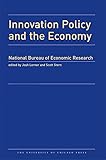Innovation policy and the economy 16
Material type: TextPublication details: University of Chicago Press 2016 ChicagoDescription: xv, 167pISBN:
TextPublication details: University of Chicago Press 2016 ChicagoDescription: xv, 167pISBN: - 9780226391854
- 338.92605 I6
| Item type | Current library | Collection | Call number | Status | Date due | Barcode | Item holds | |
|---|---|---|---|---|---|---|---|---|
 Book
Book
|
Ahmedabad General Stacks | Non-fiction | 338.92605 I6 (Browse shelf(Opens below)) | Available | 198997 |
Browsing Ahmedabad shelves, Shelving location: General Stacks, Collection: Non-fiction Close shelf browser (Hides shelf browser)
| No cover image available | No cover image available |

|

|

|

|

|
||
| 338.9173 Z6F6 Foreign trade and human capital | 338.9173059 M6P6 The Politics of foreign aid: American experience in Southeast Asia | 338.924 M4I6 Industrial research development and innovation in central public sector enterprises | 338.92605 I6 Innovation policy and the economy 16 | 338.927 B8 Business interests and the environmental crisis | 338.927 B8F6 Foundations of environmental economics | 338.927 G2F4 Fixation: how to have stuff without breaking the planet |
The papers in the sixteenth volume of the National Bureau of Economic Research’s Innovation Policy and the Economy offer insights into the changing landscape of innovation by highlighting recent developments in the financing of innovation and entrepreneurship and in the economics of innovation and intellectual property. The first chapter, by Ramana Nanda and Matthew Rhodes-Kropf, explores the process of experimentation in the context of financing of technology start-ups by venture capitalists. The second, by Yael Hochberg, also analyzes the role of entrepreneurial experimentation by systematically examining the rise of start-up accelerators. The third chapter, by Heidi Williams, studies the relationship between the strength of intellectual property rights and innovation. The fourth paper, by Fiona Scott Morton and Carl Shapiro discusses recent changes to the patent system and whether they align the rewards from intellectual property with the marginal contributions made by innovators and other stakeholders. The final chapter, by Karim Lakhani and Kevin Boudreau, focuses on the potential use of field innovation experiments and contests to inform innovation policy and management. Together, these essays continue to highlight the importance of economic theory and empirical analysis in innovation policy research.
https://www.press.uchicago.edu/ucp/books/book/distributed/I/bo24397820.html
There are no comments on this title.

